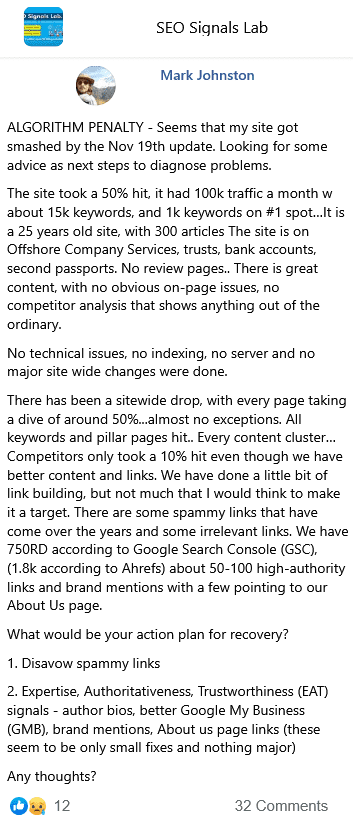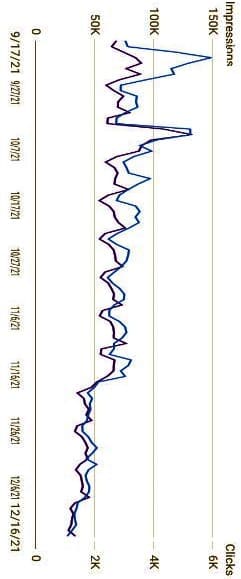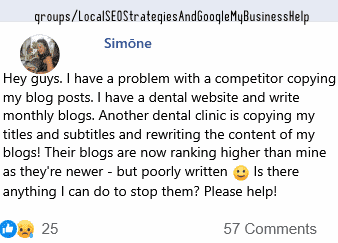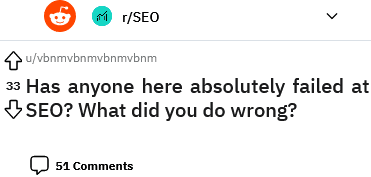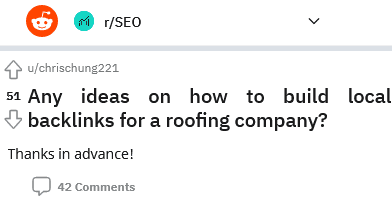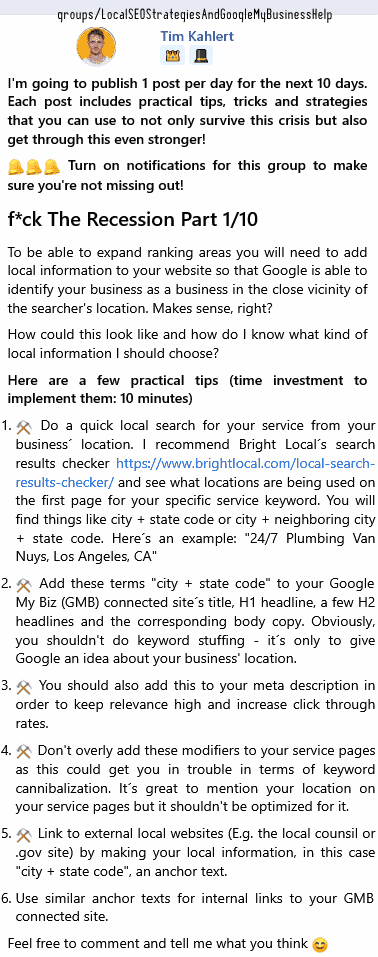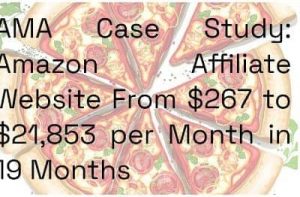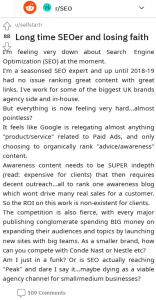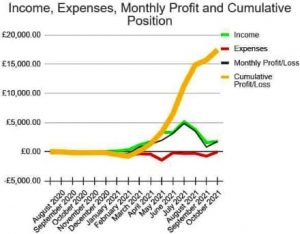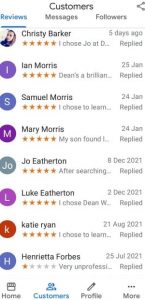ALGORITHM PENALTY – Seems that my site got smashed by the Nov 19th update. Looking for some advice as next steps to diagnose problems.
The site took a 50% hit, it had 100k traffic a month w about 15k keywords, and 1k keywords on #1 spot…It is a 25 years old site, with 300 articles The site is on Offshore Company Services, trusts, bank accounts, second passports. No review pages.. There is great content, with no obvious on-page issues, no competitor analysis that shows anything out of the ordinary.
No technical issues, no indexing, no server and no major site wide changes were done.
There has been a sitewide drop, with every page taking a dive of around 50%…almost no exceptions. All keywords and pillar pages hit.. Every content cluster…Competitors only took a 10% hit even though we have better content and links. We have done a little bit of link building, but not much that I would think to make it a target. There are some spammy links that have come over the years and some irrelevant links. We have 750RD according to Google Search Console (GSC), (1.8k according to Ahrefs) about 50-100 high-authority links and brand mentions with a few pointing to our About Us page.
What would be your action plan for recovery?
1. Disavow spammy links
2. Expertise, Authoritativeness, Trustworthiness (EAT) signals – author bios, better Google My Business (GMB), brand mentions, About us page links (these seem to be only small fixes and nothing major)
Any thoughts?
10 👍🏽2 😢1232 💬🗨
📰👈
📰👈
First… Don't disavow anything. If you don't have a penalty and you know you haven't done anything shady to get links – then avoid that page.
Now… you keep talking about a loss of traffic, but I don't see anything about a loss of ranking… did rankings drop? Or just impressions and traffic?
💟8
ya massive drops in rankings…hundreds of snippets and hundreds of #1 spot rankings lost…most main keywords lost.
The disavow file I was looking at, because there are a few sketchy links, not on a mass scale but they are there, and we were targeted with mass spam on several pages in the past…but only 2 dozen pages
Truslow 🎓
In cases like this.. it tends to be a change in Google's understanding of the search term. Hard to say without knowing more, though.
I wouldn't worry about a few dozen links.
A client who also does some work on their own without checking with me first (much to my dismay sometimes) found a link tool (not sure which one) that pointed out a few sketchy links. Meanwhile, some links that they did get via somewhat dark methods were not flagged by the tool. They went in and disavowed the links the tool identified. Two days later – manual penalty for the dark links.
So… basically (at least from my limited experience with this) running the disavow tool seems to sort of be treated as an admission of guilt. You use it and then Google takes a closer look at the rest of your link profile. If it spots something, it gets flagged and a human goes to check it out and throw in the penalty flag.
So… anyway… I recommend avoiding that unless there is real danger and you're actually getting completely rid of the danger while you're in there.
Mark ✍️ » Truslow
"change in Google's understanding of the search term" Interesting…I think this is what Ammon Johns just mentioned and something that I feel like I should go into more especially…When you look at Expertise of an article what stands out for you? As I see very similar, if not lesser quality articles taking those top spots
Truslow 🎓
You're hung up on E-A-T. I'm not talking about that at all. I'm talking about Google changing its very understanding of a search term.
It's typically something like this…
You have a page that has a TON of great, high quality content that defines, explains and gives great advice about "Widgets".
For a long time now, you've ranked well for the search term "Widgets". Google understood that when someone searched for that, it meant that they wanted to learn as much as they could about widgets – in other words, it was interpreted by Google as an informational intent search.
Now, some time goes by and Google starts to realize that quite a few people who search for "Widgets" are actually looking to just outright buy a widget. They don't necessarily want information – they want to buy.
So, they toss in a mix of "information pages" like yours – but also a bunch of pages that sell widgets. So you didn't really go down or do anything wrong – you just have to share the same Search Engine Result Pages (SERP)s with a bunch of schmoes selling widgets. With all those extra pages in there – you're bound to move around a lot.
These things can happen seasonally and for other temporary reasons too. For example, if I search for "Christmas Trees" right now, Google can be fairly certain that I want to buy a Christmas Tree. So the search results are likely to be dominated by places that sell trees near me.
If I search for Christmas Trees in July, though… well, chances are I don't want to buy one. So now Google is going to show me things like pages with pictures of them, or pages that talk about the history or types of them, and that sort of thing.
Basically – it's, as I said before, a change at the very core of how Google understands a search term.
Mark ✍️ » Truslow
I see what your saying…
The thing is, I just don't see search intent changing that radically, especially for hundreds of pages and thousands of keywords, when what is replaced is just a similar version of mine…If search intent changed that much you would then expect competitors with similar pages to also be affected
Truslow 🎓
Look at the Search Engine Result Pages (SERP)s. If you study them and the types of pages that are showing up – you can see what Google thinks it means – or in many cases you'll see a mix where Google says, It might be this OR that – so I'll show a mix of both.
If that changes – how Google interprets the search – then the SERPs landscape changes. That's why it's not just important to track traffic and rankings – you need to KNOW the what the SERPs look like for your term – that makes it a lot easier to see what changed in there when something like this happens. If you haven't been studying them – you won't know what changed, but you can still see where it stands now.
I can also say with fair certainty that Google has understood keyword stuffing for a while. A page that was ranking last week and has had nothing change on it is almost certainly NOT going to suddenly stop ranking because Google says, "oh wait, I never noticed that this guy was keyword stuffing before."
Mark ✍️ » Truslow
Makes sense. I suppose I didn't look much at page level changes I was focused on site level issues…will have to investigate
📰👈
Ammon Johns 🎓
Google had a little flurry of activity just ahead of and since November. A spam update, and a product based update, and the big Core Update on top.
You did NOT get a penalty. You are still getting traffic. Instead, the algorithm updated – it changed the signals it is using, and how it is weighing them in the overall mix. i.e. the changes are not a temporary thing you 'recover' from, but a new system you adapt to.
If your understanding of Expertise, Authoritativeness, Trustworthiness (EAT) signals is what you suggested above, author bios, Google My Business (GMB), and Brand mentions, then that might be a sign of what is lacking. Because that's not EAT
Expertise, Authority, Trust, are not a single metric, nor even three specific metrics. It came from something human Quality Raters were asked to assess and look for. The only reason it is valid to Search Engine Optimization (SEO) then is because it tells you what the humans behind the algorithms are looking to assess in the results of their entire algo.
Expertise isn't just having author bios. It's about being the kind of respected voice even rivals acknowledge. Do others cite your expertise. Would your authors be called on as an 'expert witness' if a court case depended on understanding of the topics? Qualifications and experience certainly count big, and author bios that link to a defined work history, so they can see that your Ahrefs Domain Rating (DR). Jane Doe is the same one that worked at X and Y major brand science facilities, has several research papers in their name, maybe a patent or two, has published a book, and qualified from whatever highly respected university. In other words, it ties in pretty closely with whether or not they are a known entity in the Knowledge Graph, and if so, what is known about them.
Expertise certainly does not just apply to the writers and people behind the content though. The page content itself should also demonstrate expertise. The content itself will talk about things known in the Knowledge Graph. Do you cover as many related entities with as many facts as the current top-rated pages do? Do you have the same facts, or have you got a couple of wild ones in there? Are you deliberately omitting a few facts because they don't serve what your agenda may be? These are all things that come under Expertise, and again, the Knowledge Graph can be a core component in assessing whether the content shows expertise, or shows bias, or looks like someone not really an expert just tried their best.
Expertise is not always a major factor – a film reviewer doesn't need to be an accomplished director and producer, but there Authority and Trust would still be important qualities. Can your positive reviews be bought with bribes? Does personal bias often come into play? Do lots of others cite your reviews as good quality? These are Authority and Trust sort of issues, without so much caring about Expertise.
You keep saying in the OP that you have better content. Google is seemingly telling you it doesn't agree. That under the old system and old algorithms, you hit enough of the right signals to convince it, but under the new measures, you don't.
👍🏽15
Thank you for your in depth reply, a lot to unpack here…
"changed the signals it is using" – This is something that I am trying to understand, but SERPs are just not making much sense atm. We were/are an industry leader in many ways…As we actually "do" the work that we talk about and provide services on the very things we write about…
Expertise, Authoritativeness, Trustworthiness (EAT) – I was just trying to identify a hole in the sites EAT, becayse as a whole I believe it is there, in many ways, and just the few things I mentioned were small holes that could potentially be issues
Expertise – In terms of expertise, there is not many other articles on the market that have the same solutions that we provide because we actually give people offshore tax, company and financial solutions that are unique in many ways, which is how the site is able to get the 600 leads from.
There are some quotes and details in major publications in about 20-40 links. The site had one thousand #1 spot rankings out of 15k keywords, which is a high percentage, we also had a large percentage of pages out of 300 that were ranking well, which is why I was confused, as to what is the cause. Many sites have taken the content that we use actually…
"Do you cover as many related entities" this is an interesting question that I think I need to go into
"That under the old system and old algorithms, you hit enough of the right signals to convince it, but under the new measures, you don't." – This is an interesting question…and is the reason why I am posting this question really, as in my books the content IS better…But I feel like I could be missing something here
However, I very well may be biased 😉 and maybe too close to the project for perspective
Many thanks for your time
Ammon Johns 🎓 » Mark
You're very welcome. And you are also very much correct that this is something you really need to examine and think about in depth, and really do the deep analysis on what is in play, and why Google's current algorithm isn't rewarding you as well as in the past, or as well as you think it should.
This is always the problem with thinking of loss of position as a 'penalty' – it stops you asking the far more important questions.
Remember, sometimes the change is not even the algorithm for the old query, but that Google are now rewriting it, based on intent, into a slightly different query, (which is invisible from our side). That kind of shift can be triggered by temporary trends, news, and changes of context.
It sounds as though you're talking about a site dealing with Financial products/services, or certainly close enough to them to be affected by Your Money or Your Life (YMYL) factors. For that reason, I agree with you focusing on EAT as a core thing to be concerned with. I just wanted to ensure you were thinking about what EAT really means.
In your position, I would start by looking at affected content – especially if the other pages now topping the SERP have changed from the ones that were there before. Have a really in-depth look at entity coverage, fact coverage, especially where your product ties into the broader context of the market to which it applies.
A tool like inlinks might be useful to do an overview of your coverage, the entities you have, and those you might be missing. Especially in comparison with what's currently ranking.
That's because if you can't find the answer there, in the content coverage and EAT signals, then the other main update has been the spam one, and it could be some of the backlinks that were helping you before got devalued.
A disavow won't help unless you have an actual penalty to backlinks, and that's only even remotely likely if the site has actively done some very questionable link-building in the past. Disavow only removes a penalty – it doesn't restore the value of those links.
So, after doing a content analysis, a really thorough link analysis comes next – particularly again comparing to what currently ranks, and focusing on the most *authoritative* links, rather than on the quantity of links, or the specific estimated values.
It's not easy. But then, few worthwhile things are.
Mark ✍️ » Ammon Johns
Thanks again for the reply…
I think I hadn't looked much into a page by page comparison as I was looking for a smoking gun. Due to the sitewide nature of the downturn having it affect almost all of the 300 pages kept me looking for something more foundational rather than anything individual.
I am sure pages are missing some facts, entities, context, relevancy, but can that actually be something that is missed on every page?…seems to convenient…esp when competition didn't get affected?…that's something that I couldn't understand
I will have a look at inlinks…thanks!
"then the other main update has been the spam one"…this is what I was thinking as we do have some, though not sure if its enough to be considered dodgy…
Andre » Ammon Johns
Thank you for this great information.
Kornblau » Moon SEO Hussain
Case study time
🤔2
Mark ✍️ » Kornblau
😉
📰👈
Roger
From impression and click screenshot, honest speaking people can't contribute much to help. At least also share the Click Through Rate (CTR) and average position lines. I guess your CTR is ok because the blue line and violet line close to each other. You should also check is it you keep on losing featured snippets. I have seen sites losing position 0 and the graph is similar to yours. I also seen sites losing impressions and clicks because Google put more widgets and the types of intent changed. Check on page level instead of the whole site. You will get better ideas and check the SERP manually to confirm
Ps: Google do not rewrite your titles because blue line and violet line close to each other. The title stuffs you can skip
Lost near hundred snippets, whole site went down, so that's several hundred pages, which would be odd to have so much intent change without competition also being affected.
Roger » Mark
Many sites they have the same issue – traffic spike, hit a "stuck" level, then no matter how many new pages added, the traffic not going up, not going down. Losing snippets is one of the reason. Google favor new content for snippets.
Links – power vs relevancy vs trust
Your case, i recommend you focus on trust and relevancy
Maybe you can do the below:
1. Find those hundred snippets that you lost, check is it belong to the same cluster. If yes, you need to build link from sites that Google trust that cluster. Or build link using "anchor" that belong to that cluster (relevancy)
2. Update the content, re-targeting those snippets. Focus more on the bold text Google show in snippets.
Option 2 will take a lot of man power and there is no guarantee how long you can claim the snippets. Personally i don't recommend this.
Honest speaking, i am doing the reserved. I target topics that do not have featured snippets, better CTR
Majority of the 300 pieces of content, is it less than 2 years old?
Mark ✍️ » Roger
Hey, thanks for that…Right now I see that its hit multiple topical clusters…
CTR is stable, just drop in SERPs, clicks, impressions.
Ya, 150 of the pages are 1-3 years..
After not being able to find anything sitewide I'm thinking of looking at pages individually and see what changed in the SERPs…whats odd is that the SERPs weren't changed that much, just me kicked out!
Roger » Mark
Your case, not analog penalty or strike. You are luck because those pages already claimed featured snippets for so long. Some sites, i only see they claimed the snippet for a while, few months, then lost it to new sites. Google favor "fresh" content a lot. It also depends on competition. If your content is really hard to clone, with unique data, graph, table, infograhics etc etc, yes, competitors will find you but they will give up. So overall, such topics, you will rank forever.
You need links now. Link, if do it right, help a lot!
If you really want to claimed back the snippets, you can try insert an unique graphic just below the text. For my case, it help. I do not change the text at all, just insert unique image and do some image SEO, claimed back the snippets ( not 100% success rate but did work )
Another sharing. Type the brand into Google image. Check your topical clusters is it still there.
Mark ✍️
Nice…Unuque images sounds like something i shoukd try thanks!
Content issnt that old, most about 2-3yrs about
Alexander
From a more technical view: when have you last updated your content? Google changes because the people who use it also change. Take a good look if the keyword you are targeting are still the same or if they are also evolving. How long are your articles compared to your competitors? Use a tool like surfer SEO to see the technical differences between you and your competitors. Its easy to blame Google ( i did when it happened to me) but Google is an algo and ranks because of factors. So when you change things for the better, eventually you can get back your visitors again.
The content isn't that old actually…and all pages are quiet long…though there might be some page level stuff I'm missing, just would be surprising to have that be the issue for all the pages…makes more sense if the hit was just in a few pages
📰👈
Somethings Not to Do to Optimize a Google My Business (GMB) or Business Profile (GBP)
